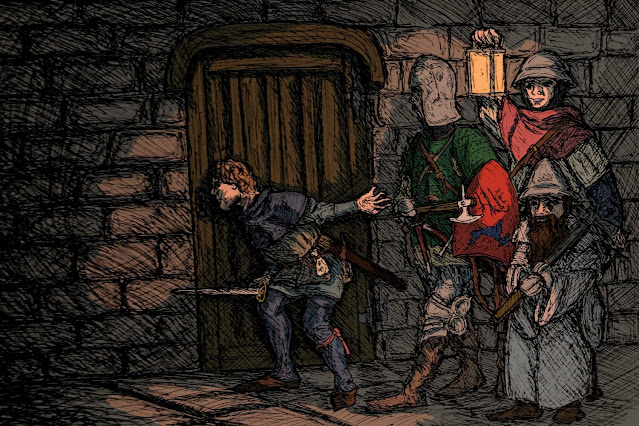Eliding Perception: What perception mechanics do to your game
In Part 1 we talked about how rules zoom out from what a game designer deems unnecessary detail to advance the game. In this way, rules make you think less about some things at the table: your Bow +1 will hit more times than a standard bow under the same conditions and it is not required for you to explain why. You may do it (maybe it has a stronger sinew string, or the wood is more flexible, or it is lighter on the hands) but, in the end, it is not necessary. Your bow +1 will always be a bow +1. In a game without predefined rules (à la FKR-style) you have to describe these details so the referee may make rulings for the different situations that may happen to that bow. You'll have to think more, and that can be a good or a bad thing depending on your gaming preferences.
If it is confusing, I suggest you read Part 1 before continuing! What follows is an application of that idea to a particular family of systems: perception rules.
Defining perception rules and mechanics
Here I want to correct a fault I made in the previous blog, an inaccuracy somewhat derived from Rules Elide, the article that spurred my article in the first place. I think that article should be named Mechanics Elide, instead of Rules Elide. Here is why:
For this article's purposes, I define perception rules as any guideline established to inform if a character senses a particular detail from her surroundings based on her sight, smell, touch, hearing, taste or proprioception.
These rules may involve the rolling of dice or not: a mechanic.
Perception mechanics are as old as the game itself. The original edition of Dungeon & Dragons from 1974 included the following:
Secret passages will be located on the roll of a 1 or a 2 (on a six-sided die) by men, dwarves or hobbits. Elves will be able to locate them on a roll of 1-4. At the referee's option, Elves may be allowed the chance to sense any secret door they pass, a 1 or a 2 indicating that they become aware that something is there.
Fast forward to 2023, passing through the post-D&D 3.0 era, the 5th edition has an open Perception skill.
As a counter-point, Cairn has this:
- Provide useful information about the game world as the characters explore it.
- Players do not need to roll dice to learn about their circumstances.
(Cairn has no dice rolls involving perception).
My point for this section is that a perception rule may or may not involve a perception mechanic. For some games perception rules involve a dice roll mechanic (e.g. D&D) and for others it doesn't (Cairn), but both have rules for it.
Even if the ruleset you are using doesn't state explicitly how to adjudicate what the characters can perceive, the Referee will have to make a ruling because TTRPGs are about characters interacting with the world, so in the end there is always a perception rule (stated or unstated, previous or made up) but no necessarily a perception mechanic.
This observation might be confusing if it is your first time wandering into the system/rule/mechanic pit. Several people have tackled this topic from different angles, but I'm sticking with Problem Machine's definitions because I find them clear and consistent across different gaming media. It is a great article, check it out later.
What perception mechanics do to your game
Perception mechanics elide. Perception mechanics zoom out from some or all the details involved in perceiving something inside the fictional world.
For a game with perception mechanics, when a player asks does it looks like the bandit is concealing a weapon? and the referee asks for a Perception roll (or whatever name it has in that particular game) there are a couple of things happening:
1. The fictional world zooms out. It won't matter where the player says the character is looking for a concealed weapon and it won't matter where the bandit hid his dagger. Those details won't matter and the mechanics will elide the need to dive deeper into the particulars of the scene.
Even if the game considers modifiers to account for these variables, it will be the dice deciding part of the fiction for the players. After a successful perception roll, the referee might tell the player you perceive an angled object in the calf of the bandit's pants, without the need for the player to inform how/where/for how long was he looking for clues of a concealed weapon.
2. The player might disconnect from the fiction. Perception mechanics that successfully inform there is nothing there hinder the fiction because the player is sure there is nothing there when, in reality, a person inside the fictional world would never know for sure if there is nothing there. They might not perceive anything, but they would never be certain of it.
This might affect how the players involve themselves in the game. Some might decide to act with the meta-certainty that there is no weapon hiding, others might know this as a player but roleplay their characters as acting with caution. In either case, there is a degree of disconnection from the fiction.
3. Luck may deprive players of satisfactory outcomes for clever solutions. If one of the players states I look for any weapon he could be hiding around his waist or ankles and the game leaves that to a Perception mechanic, there is a chance she will not find something she was looking for with the correct mediums on the right place at the right time, which can happen, but has to do more with luck than with the character's talents, especially when the player sat all the pieces in the correct position.
Perception mechanics habits
Some games acknowledge these situations and inform the players to roll only if it is a risk, if it makes sense or if it is a degree of uncertainty.
In my experience -and allow me to divert from the more neutral tone I've been using up until now-, it is hard to not misuse perception mechanics when they are available, even if it wasn't the designers intention. I think a lot of us have experienced or witnessed, as players or referees, situations when someone uses perception mechanics to the air just to see if there is something vague but interesting in the scene or referees asking for perception checks when nobody has stated they are looking for anything. This is as valid an approach as any other, but I'd argue it comes more from having the perception mechanic at hand than a design choice.
Closing ideas
Every game group has its gaming preferences and dynamics, and I wanted to write about this topic without bashing one game design decision or the other, but I do think it is important that one understands how the rules and mechanics impact the experience at the table. Only then you can tailor the fun you want to have.
Maybe you play Friday night, tired and without the need to have Tolkien-esque descriptions. Maybe you want to feel the game is driven by a direct interaction with as many fictional elements as possible.
Both are good and can be reinforced with the appropriate tools.
Post-scriptum
There may be a Part 3 to this series, as there are some floating, related topics I think can be expanded. Let me know if there is something of particular interest to you!
Further Reading:
Rules vs. Mechanics, by Problem Machine.
What is a Tabletop RPG System?, by Grumpy Wizard.



Comentarios
Publicar un comentario